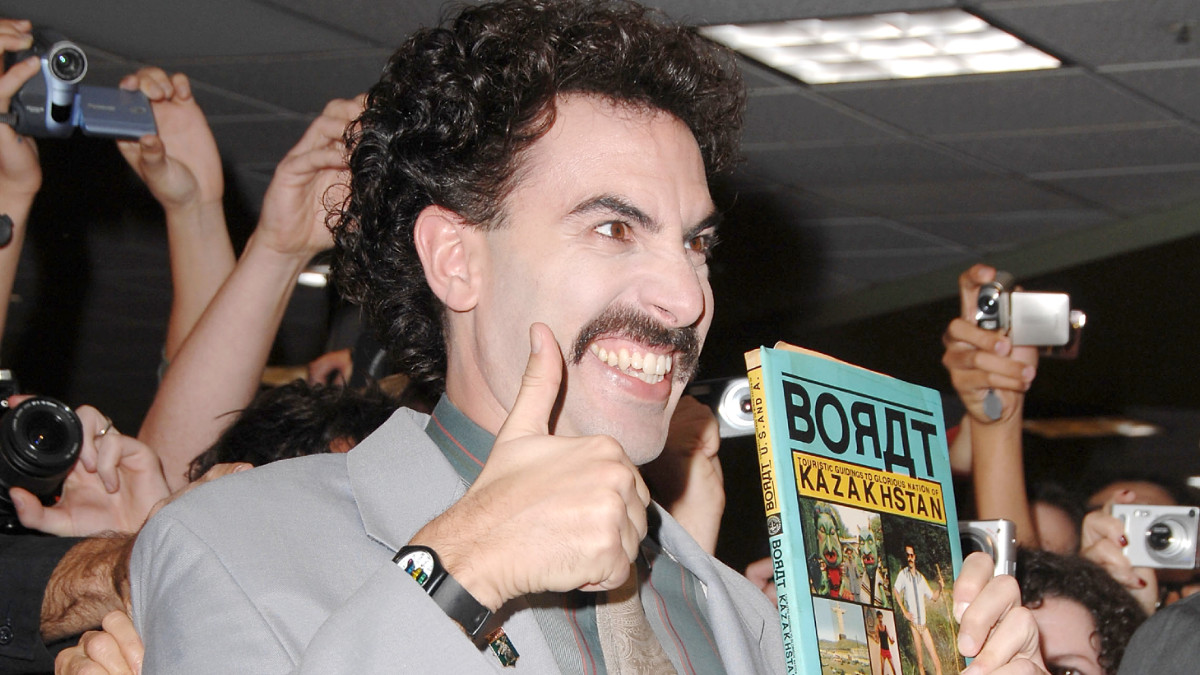Sacha Baron Cohen has revived his Borat character in time for the 2024 U.S. Presidential Election — but as many critics have pointed out, it’s not 2006 anymore.
The actor has his own history with racism, and an expensive, legally troubling one at that, particularly in the case of Ayman Abu Aita, a Palestinian Christian man who sued the star for portraying him in one of his films as an Islamic fundamentalist terrorist.
Appearing as the fictional Kazakhstani journalist on The Tonight Show With Jimmy Fallon, Cohen used the character, who first appeared in the hit ’00s black comedy of the same name, to mock Donald Trump during a skit where he moderated a debate between the former President and Kamala Harris — mostly at the expense of Kazakhstan.
“Mr Trump, sir, you say in Ohio that people eat the cats and the dogs,” Cohen said, referring to Trump’s now-infamous September 2024 debate claim. “Which restaurant do they serve them at?” Cohen said, donning a fake mustache and using the famous Borat voice. “Can you get me a reservation, please? “In my country, we have KFC – Kazakh Fried Cat – it’s p***y-licking good!”
The joke that Borat — a fictional Kazakhstani living in the U.S. — eats cats creates a punchline that aligns with Trump’s belief that immigrants, especially those born outside the U.S., do eat pets.
Cohen also joked that Kamala, as “a woman, person of colors,” and “married to a Jew,” would be subject to the death penalty in Kazakhstan, despite the fact Kazakhstan is an Asian country with an ethnically diverse population, that sheltered over 100,000 Jewish refugees during the Holocaust, according to World Jewish Congress.
The Borat character has been criticized for stereotyping foreigners since its inception, with the nation of Kazakhstan offering Cohen an invite shortly after the film’s 2006 premiere to set the record straight on the country’s treatment of women and Jewish people. While the character is not entirely reflective of Cohen’s personal views, Borat and its 2020 sequel were condemned for “coaxing Americans (often Republicans) into feeling comfortable enough to expose that they hold those views themselves,” as The Independent described the films’ reception.
Cohen, however, seems unconcerned with these critiques. Alongside the recent Borat revival, he has continued to play several fictional characters, all foreigners that hold bigoted views, as shown in The Dictator (2012), and Brüno (2009), with the latter serving as the strongest example of how ethnic stereotyping in his films can ruin real lives.
In a post that has since amassed over 40,000 likes, including responses from fellow actor John Cusack, Chelsea Hart’s tweet about Sacha Baron Cohen’s depiction of Ayman Abu Aita is one of several now-viral reminders of the depths of Cohen’s dangerous ethnic stereotyping.
Aita, a Palestinian Christian who worked as a shopkeeper in Bethlehem, was interviewed for a scene in Brüno, in which he was portrayed as a member of the militant al-Aqsa Martyrs’ Brigade, a group identified as a terrorist organization in the U.S. and Europe. In his brief appearance filmed an Israeli-controlled area of the West Bank, Brüno asks Aita to kidnap him in an attempt to resolve the Israeli-Palestinian conflict.
Aita was unaware that he was going to be in the film, having found out from a third party after its release. In a $110 million lawsuit settled out of court for an undisclosed fee, Aita accused Cohen of mistranslating his Arabic responses to English to make him appear more threatening to Western audiences.
Aita, a board member of the Holy Land Trust, a non-profit Palestinian organization that aims to create a “lasting and just peace in the Holy Land grounded by honoring the dignity and rights of all peoples,” stated in the suit that Brüno undermined peace processes in the area and damaged Aita’s “reputation, […] his standing in the community,” and that Cohen had “made millions on the back of” Aita’s personal dignity and safety.
